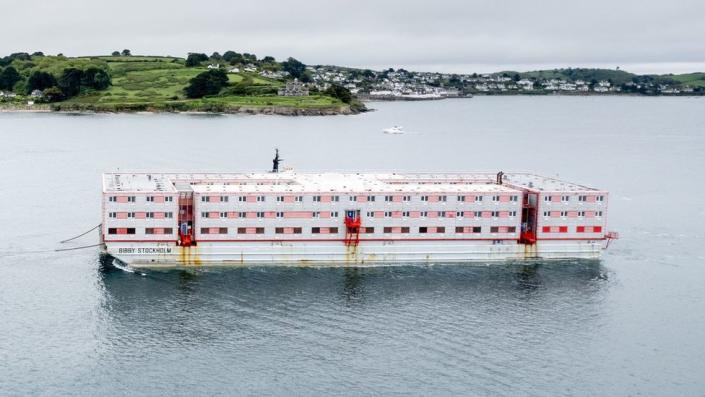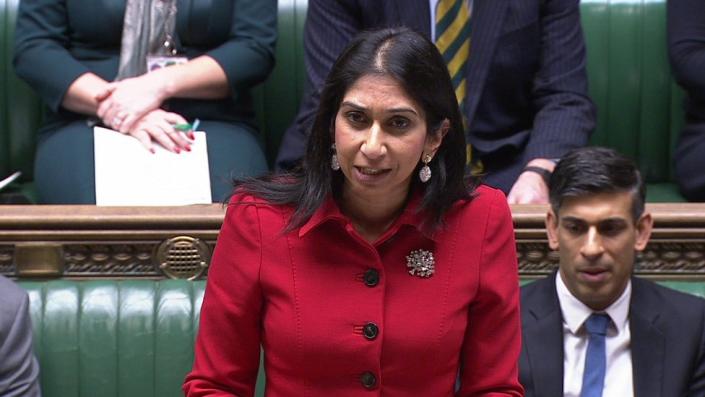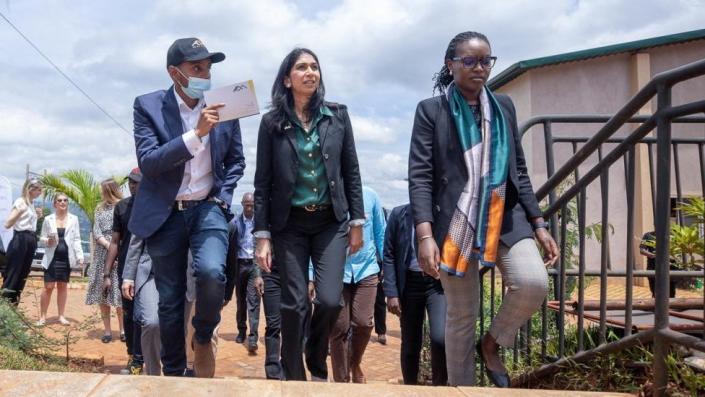
The first 50 asylum seekers are due to arrive on the Bibby Stockholm barge in Dorset.
The accommodation is part of the government’s plan to deal with the large numbers of people arriving in the UK on small boats.
What has the government said about migrant accommodation?
In March 2023, it said that three ex-military sites in Essex, Lincolnshire and East Sussex would house several thousand migrants:
-
Wethersfield in Essex is due to hold up to 1,700 people
-
Scampton in Lincolnshire is due to hold up to 2,000 people
-
Bexhill in East Sussex is due to hold up to 1,200 people
Catterick Garrison in Yorkshire is also due to open soon, but the government has not yet said how many people could be housed there.
Forty-six asylum seekers have arrived at the Wethersfield site. The first asylum seekers were expected to arrive at Scampton in mid-August, but this has been delayed until October 2023.
Local councils in Lincolnshire and Essex both initially lost legal challenges to prevent bases being used to house asylum seekers, but the High Court ruled that some of the points made by Braintree and West Lindsey District Councils needed a fresh hearing.

In April 2023, the government announced that a barge called the Bibby Stockholm would host up to 500 adult male asylum seekers in Dorset.
The barge arrived in Portland on 18 July and is expected to receive its first 50 asylum seekers in early August. Plans to move people on board were initially delayed because of fire safety concerns.
It has also been reported that the Home Office is considering using tents to accommodate some asylum seekers.
The government hopes these measures will reduce the amount of money it spends on accommodation. At the end of March 2023 there were more than 47,000 asylum seekers living in hotels across the UK.
A Home Office official told a committee of MPs that the department was also paying to keep nearly 5,000 hotel beds empty to prevent overcrowding at detention centres.
What is the government’s plan to tackle migrants?
Under the Illegal Migration Bill, which passed in July 2023:
-
the home secretary has a duty to detain and remove those arriving in the UK illegally either to Rwanda, or another “safe” third country
-
migrants will not be granted bail or able to seek judicial review for the first 28 days of detention
-
under-18s, those medically unfit to fly or at risk of serious harm in the country to which they are being removed, will be able to delay departure
-
the number of refugees the UK settles through “safe and legal routes” is capped.
Shadow home secretary Yvette Cooper criticised the new legislation, which she said “fails to tackle the criminal smuggler gangs, and makes it easier for traffickers”.
She added that the lack of returns agreements with other countries “will just increase the asylum backlog with even more people in costly hotels”.
Also part of the government’s plan is a new agreement with France, under which the UK will pay £500m over three years to fund more patrol officers and a new detention centre.
The government said its returns agreement with Albania had reduced small boat arrivals from the country.

What are the “safe and legal” routes to claim asylum in the UK?
The Home Office insists there are a number of “safe and legal” routes to the UK.
However, some are restricted to people from specific countries such as Afghanistan and Ukraine, while other routes only accept limited numbers. Figures shown are for the year to March 2023:
-
UK Resettlement Scheme – prioritises those from regions in conflict (1,056 grants issued)
-
Community Sponsorship Scheme – for local community groups to provide accommodation and support for refugees (309 grants)
-
Refugee Family Reunion – for partners and children under 18 of those already granted protection in the UK (6,029 visas)
-
Mandate Resettlement Scheme – to resettle refugees who have a close family member in the UK who can offer a home. (Six resettled; about 430 refugees accepted since 2004)
In April 2023, Immigration Minister Robert Jenrick was asked in Parliament which safe and legal routes were available to a young person wanting to flee the conflict in Sudan.
He said, “the best advice would be for individuals to present to the UNHCR [UN Refugee Agency]. We already operate safe and legal routes with them.”
But the body insists “there is no mechanism through which refugees can approach UNHCR with the intention of seeking asylum in the UK”.
What does international law say about refugees?
Critics of the government’s asylum proposals, such as the Refugee Council, say they risk breaking international law.
The main principle of the 1951 Refugee Convention states that refugees should not be returned to countries where they faced threats to life or freedom.

The government insists its plan to send migrants to Rwanda for their asylum cases to be heard complies with international law.
But the Court of Appeal ruled in June 2023 that sending asylum seekers to Rwanda was unlawful and risks breaching Article 3 of the European Convention on Human Rights.
The government is taking the case to the Supreme Court.
Clarification 2 December: This article has been amended to make clear that the government’s “safe and legal” routes are only available to certain groups of people who have already been recognised as refugees, or family members of refugees already in the UK.
